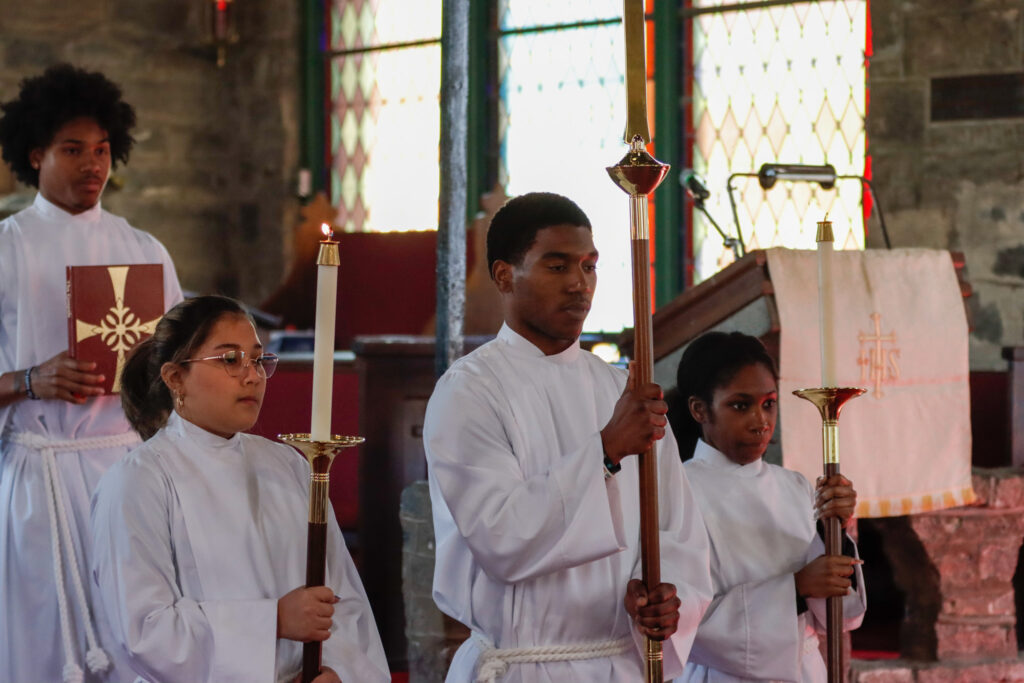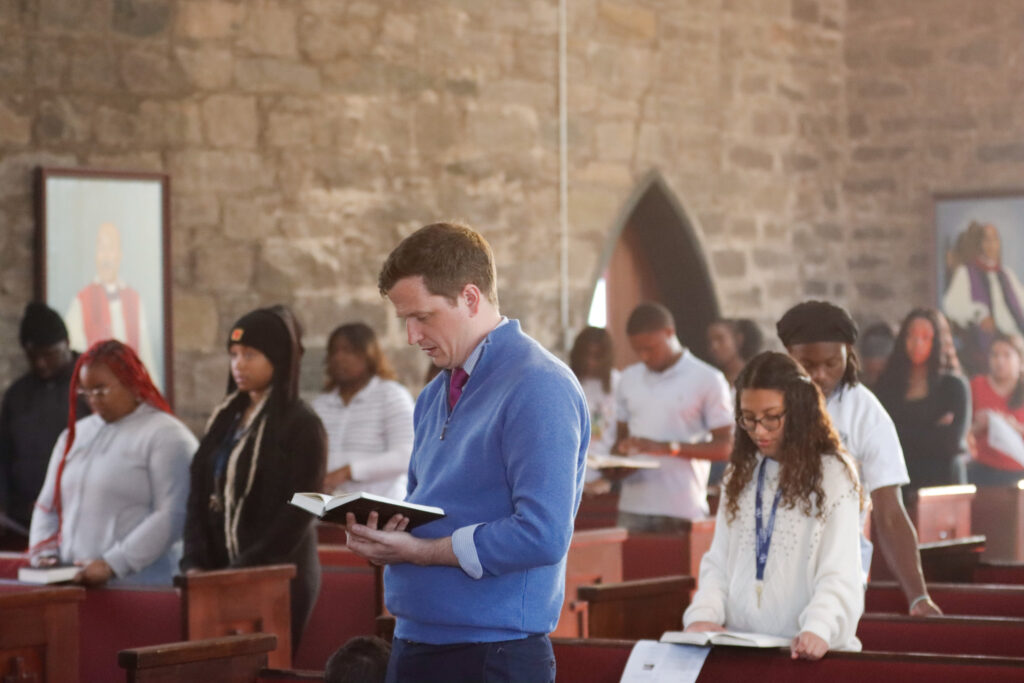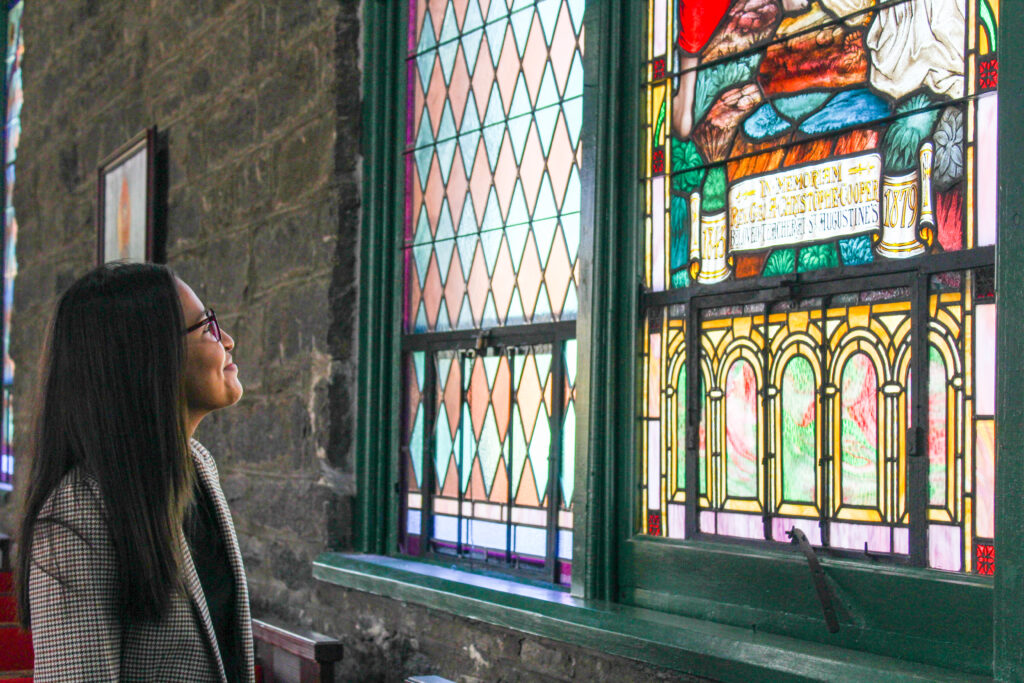SAINT AUGUSTINE’S CHAPEL WORSHIP COMMUNITY
In the spirit of the church tradition of painting our doors red, Saint Augustine’s Chapel strives to be a welcoming and safe place for our students and the community. Services of Holy Eucharist are held on Sundays during the academic year, where we hear the Word of God and partake of the sacraments. We invite you to visit our chapel during worship times and open yourself to the possibilities of a spiritual journey anchored in a relationship with Jesus Christ and nourished by Christian community. We have a relaxed service infused with the participation of students with a diversity of talents ranging from our Divine Dance Worship to our University Choir.
As an Episcopal Chapel, we recognize that students bring the gifts of a diversity of beliefs, experiences and talents, and we treasure this diversity. We strive to be an inclusive and welcoming community, embracing a diversity of cultures and united through the unconditional love of Jesus Christ. The university chapel program and religious life at Saint Augustine’s University is a place to study, pray, and worship together, deepening our faith so that we may be transforming agents sent forth to serve God in the world.
Chapel Open Hours
Tuesday - Thursday 10 a.m. - 1 p.m.
Why the Red Door?
“In the earlier days of the church it was understood that a soldier could not pursue an enemy that had entered through the red doors of a church. The red doors were a symbol of refuge and sanctuary for all people who entered. To all concerned the red on the doors signified the blood of Christ that had been shed so that all who came to him could be saved. Anyone who passed through those doors was safe as long as they stayed behind them. Over time, Christian people began to see the red doors of the church as symbolizing not only physical refuge and safety, but spiritual refuge as well.
The blood of Jesus, and of the Church’s martyrs, that the red doors of the church symbolized, would protect you from evil, both physical and spiritual. The red doors spoke to the world of holy ground that existed inside those doors, space that had been purged and made clean by God’s Holy Spirit. Today people choose to paint their church doors red for many of the same reasons that churches did centuries ago.”
Sunday Worship
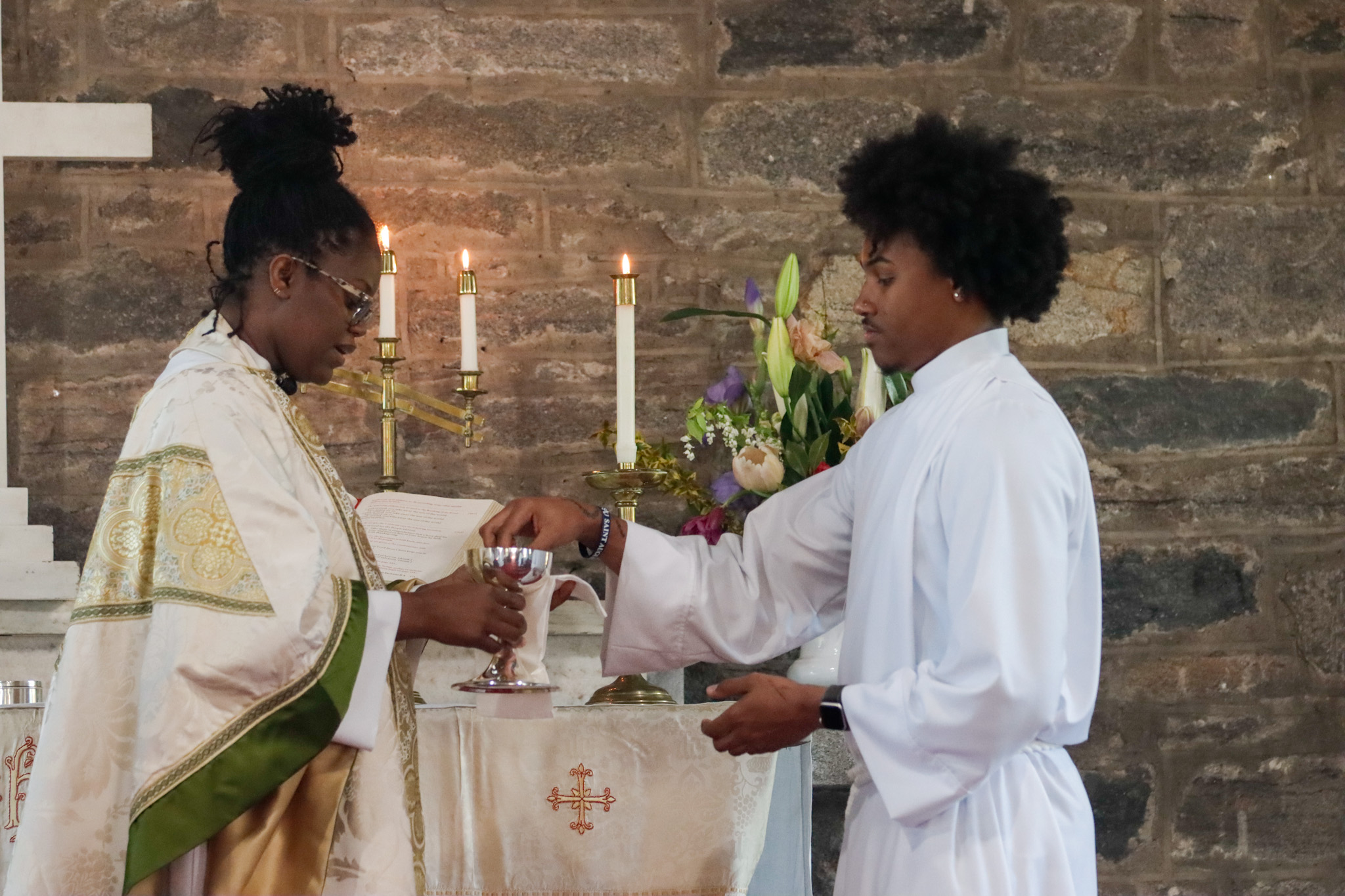
Follow us on the Chapel Facebook for Live Virtual Worship Service!
Worship & Wonder Speaker Series
September 24, 2023
Dr. Mark Andrew Jefferson
Dr. Jefferson’s preaching, scholarship, and engagement with popular culture outline his commitment to be a public theologian. Dr. Mark Andrew Jefferson is the CEO of Maleko Global Partners (MGP), a consulting firm that specializing in equipping and empowering leaders, especially clergy. Prior to founding Maleko Global, Dr. Jefferson taught homiletics (preaching) at the Virginia Theological Seminary in Alexandria, Virginia. Before joining the Seminary faculty in 2016, Mark was an adjunct professor at Pittsburgh Theological Seminary in Pittsburgh, PA, and previously taught at the Candler School of Theology at Emory University in Atlanta, GA.
Dr. Jefferson holds a Doctor of Philosophy (Ph.D.) in Religion focusing on Homiletics from Emory University where he was a doctoral fellow for the Fund for Theological Exploration (FTE) and the Lilly Foundation. During his doctoral work, he received the W.E.B. Du Bois Award from the Candler School of Theology. Active in the life of the church in graduate school in Atlanta, Dr. Jefferson was the Director of Christian Education at The Greater Travelers Rest Baptist Church, which, at the time, was counted as one of the fastest-growing churches in the country, according to Outreach Magazine. He holds a Master of Divinity degree from the Candler School of Theology at Emory University, where he concentrated his coursework in homiletics, completed a certificate in Black Church Studies, and served as President of the Black Student Caucus. He majored in Political Science and concentrated in Public Administration at Norfolk State University (NSU) in Norfolk, Virginia. While at NSU, he served as the President of Pi Sigma Alpha (the political science honor society), earned the Vince Lombardi Most Outstanding Football Athlete Award, and was named a Coca-Cola Academic All-American.
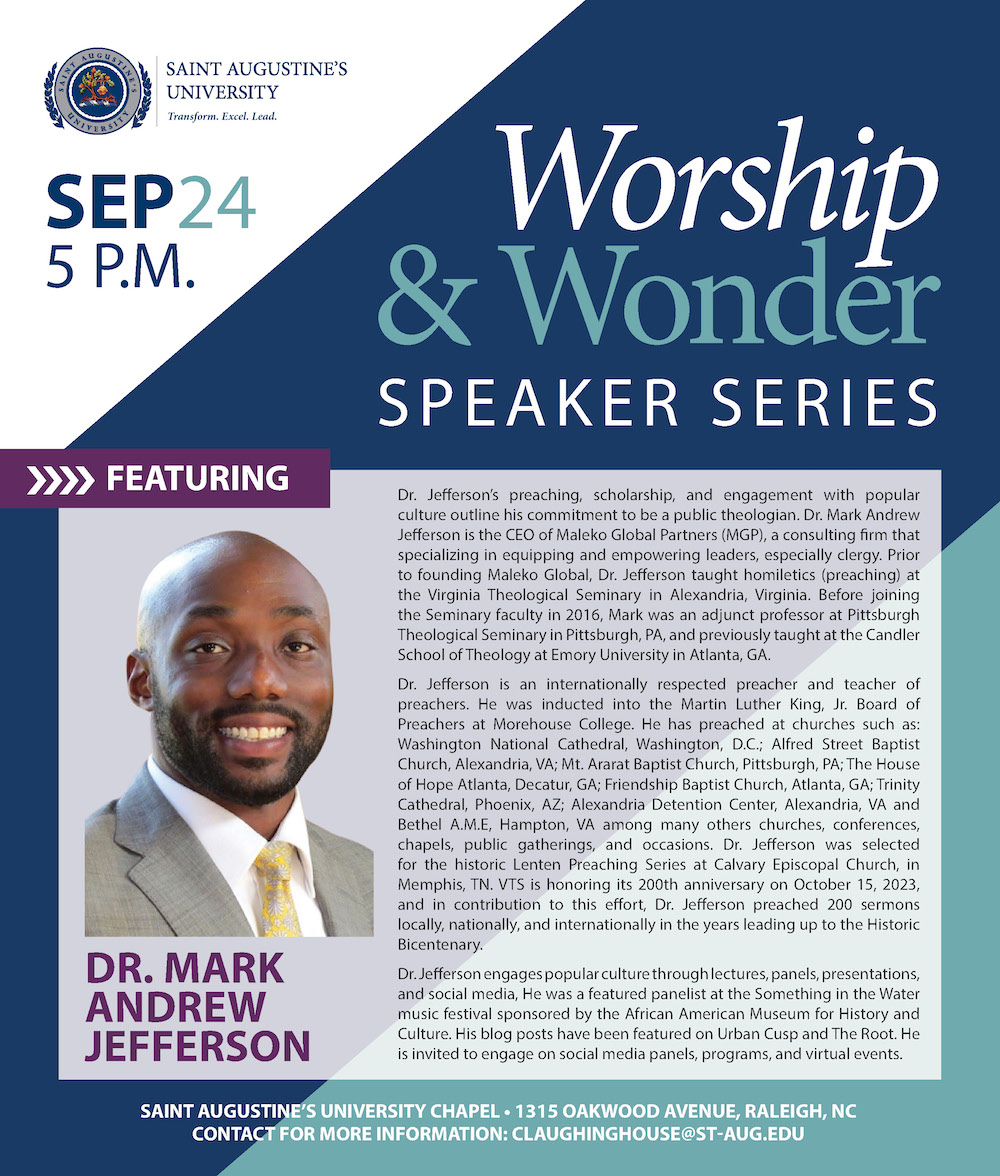
August 27, 2023
Pastor Timothy D. Careathers
Pastor Timothy Careathers is the senior pastor/teacher of the Friendship Missionary Baptist Church, located in Fayetteville, NC and is married to the former Jill L. Baskerville.
Pastor Careathers commenced his preaching ministry in March of 2000 at the Greater Second Missionary Baptist Church, in Chattanooga, TN under the leadership of Pastor Willie Paul. He received a Bachelor of Arts Degree in theology from American Baptist College in Nashville, TN. Prior to pastoring the Friendship Missionary Baptist Church he pastored the Westside Missionary Baptist Church in Chattanooga, TN for 15 years.
Pastor Careathers’ commitment to social justice and prophetic witness is not only evident in his proclamation of the Gospel but in his community activism and civic leadership throughout his ministry. He has served as a member of the Clergy Koinonia of Greater Chattanooga; as a board member and co-chair of the Spiritual Enrichment Department of the Servant Leadership Christian Fellowship; on the governance committee of the Alternative Seminary; on the Board of Directors of The Sanctuary; on the board of directors at The Bethlehem Center. He is also the co-founder and former president of the Hamilton County Black Caucus in Chattanooga, TN and founder and former board chair of The Net Resource Foundation, an asset based non-profit organization.
He is currently pursuing a Master of Arts degree in Theology from the McAfee School of theology, Mercer University. Pastor Careathers is also a published author of the book “Supernaturally Natural.”
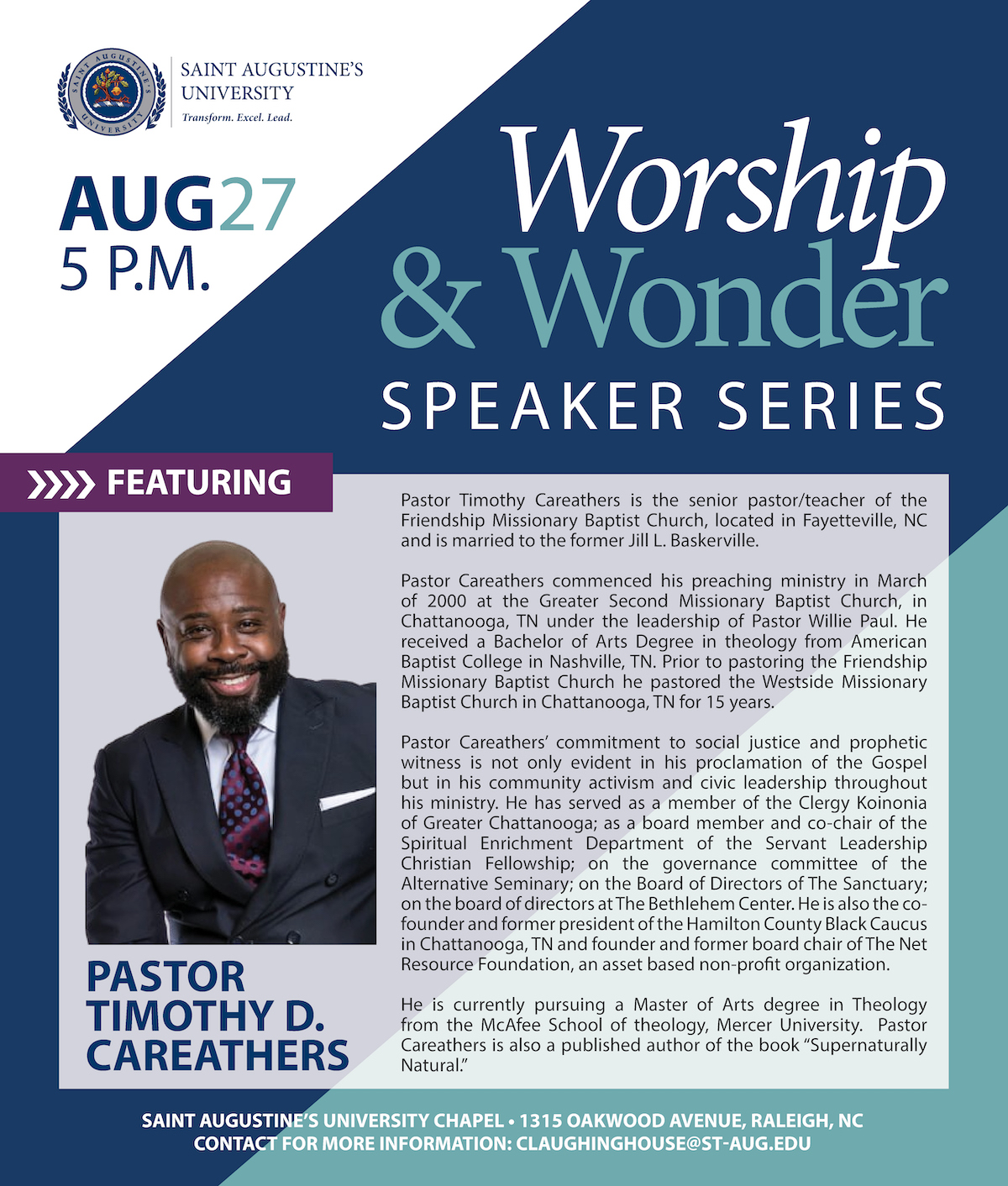
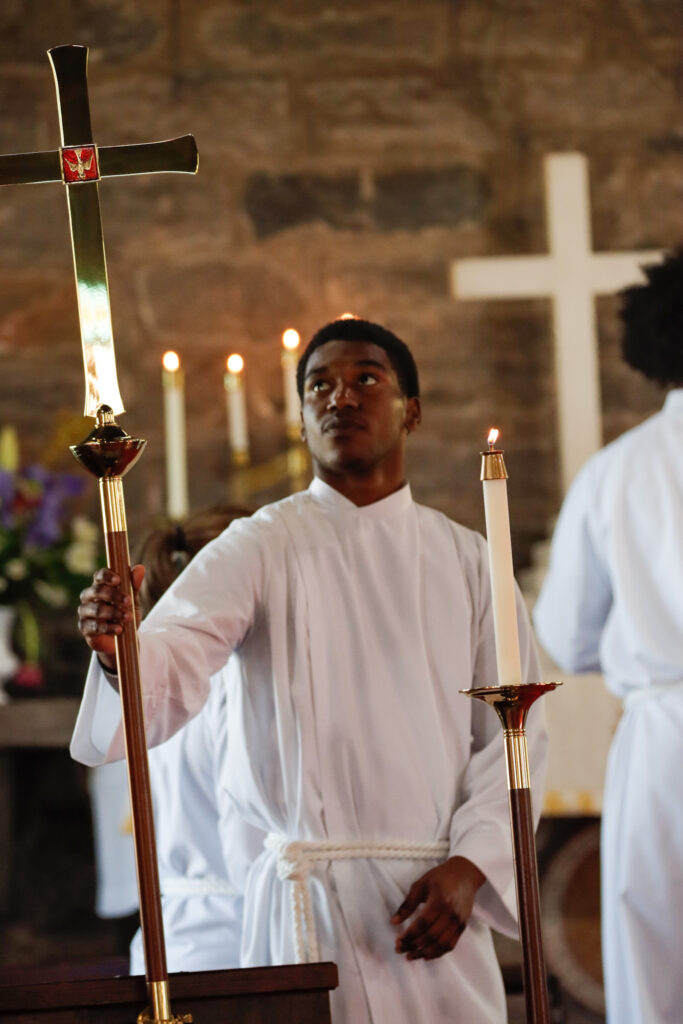
UPCOMING CHAPEL EVENTS
There are no upcoming events at this time.
ARCHIVED VIDEOS
MESSAGE FROM THE DEACON
Deacon Sallie Simpson will continue to be available to the Saint Augustine’s University “family” during our physical separation. Anyone can contact her via email at scsimpson@st-aug.edu. She will check that mailbox twice a day during this time and respond by phone or email as appropriate.
Scholarship Opportunities
Absalom Jones Institutional Tuition Grant
The Episcopal Church Educational Scholarships
Mary-Margaret Kellogg Scholarship
FAQs ABOUT THE CHAPEL & THE EPISCOPAL CHURCH
How did Saint Augustine’s Chapel begin?
A worshiping congregation was formed at Saint Augustine’s Normal School on February 11, 1868. The congregants met on the school’s campus until a building was erected on Dawson and Lane streets in Raleigh, NC. The North Carolina Legislature granted the land at this location for the building of a worship space. Ten members from Christ Church, Raleigh transferred to the new church. Other members included students and faculty who attended the new worship community.
Washington Hayes and the Reverend Henry B. Delany, later Suffragan Bishop of the Diocese of NC, began construction on the current chapel on the property of Saint Augustine’s Normal School. The Rev. Delany was the quarry master and masonry instructor at that time. Under his direction, the students quarried the stones for construction, and laid the cornerstone in 1895. The construction was completed in December 1895. A year later, the church located in downtown Raleigh was renamed the Church of Saint Ambrose upon recommendation by Bishop Cheshire and permission of the Diocesan Convention. Finally on October 11, 1897, the chapel was consecrated “Saint Augustine’s Chapel” by the Rt. Rev. Joseph Blount Cheshire, Bishop of the Episcopal Diocese of North Carolina.
When did the Episcopal Church Begin?
The Episcopal Church is a province of the worldwide Anglican Communion.When England established colonies in America, Anglican worship was established in the British colonies.Following the Revolutionary War, and the establishment of the United States of America, “three clergy and twenty-four lay delegates met at Chesterton Maryland on November 9, 1780 and resolved that ‘the Church formerly known in the Province as the Church of England should now be called the Protestant Episcopal Church.’ The word ‘Protestant noted that this was a church in the reformation tradition, and the world ‘Episcopal’ noted a characteristic of catholicity,” namely being under the pastoral leadership of bishops.
What makes us Anglican?
The Episcopal Church is part of the Anglican Communion. The word communion means having fellowship, affection, and togetherness with another. We share in relationship with other provinces of the Anglican Church from around the world. There are several attributes which we share with Christians in the Anglican Church that mark us as Anglican.
- We are Protestant, yet Catholic: As an Anglican church The Episcopal Church “stand squarely in the Reformed tradition, yet considers itself just as directly descended from the Early Church as the Roman Catholic or Eastern Orthodox churches.”
- Like all Anglican Churches, the Episcopal Church believes that Christians should be able to worship God and read the Bible in their first language.
- The Episcopal Church uses the Book of Common Prayer for Worship. This book is a “collection of worship services that all worshipers in an Anglican church follow.It is called common prayer because we all pray it together, around the world. The first Book of Common Prayer was compiled in English by Thomas Cranmer in the 16th Century.”
- Faith informed by Scripture, Tradition, and Reason: The Anglican tradition acknowledges that the Holy Scriptures are the Word of God and “completely sufficient to our reconciliation to God, and must always speak to us in our own time and place.”As Anglicans we look to two thousand years of tradition which can inform our understanding of scripture. These traditions of the Church connect us with all generations of believers as we seek to interpret scripture. We are also created by God with intelligence and particular experiences which form our God given reason. We use this reason along with the traditions of the church to discern how scripture relates to our own lives….
Why does SAU have Saint Augustine’s Chapel as a place of worship for students?
Saint Augustine’s University is an institution of importance for The Episcopal Church, and is committed to the spiritual growth and formation of students.The chapel serves as a place of worship on Sunday mornings, and the chapel office coordinates campus religious life. Additionally, Saint Augustine’s University is affiliated with two associations which connect the university to The Episcopal Church and the Anglican Communion.These organizations are the Association of Episcopal Colleges (AEC), and Colleges and Universities of the Anglican Communion (CUAC). Click here for more information on CUAC.
What do I need to do to be a baptized Christian?
We welcome individuals who seek baptism. As a sacrament instituted by Jesus Christ, baptism initiates individuals into Christ’s Body by water and the Holy Spirit. Baptism occurs during a service of Holy Eucharist at various times of the year. The Episcopal Church baptizes people of all ages, and at Saint Augustine’s Chapel we have provisions for baptism by immersion or by pouring water upon the candidate. If you desire to be baptized, contact the university chaplain, The Rev. Hershey Mallette Stephens at 919.516.4241 or by email at hmstephens@st-aug.edu to attend a baptism, get information and preparation session.
Who in The Episcopal Church has spiritual formation resources for individuals?
There are numerous resources for spiritual formation. Students at Saint Augustine’s University should investigate the religious life programs in the following ways. There are excellent online resources by the Society of Saint John the Evangelist. You can sign up to receive a daily reflection by email, read sermons, and learn about prayer. You may also view the Daily Office at Forward Movement’s online service, or The Chapel. These are simply a few of the online resources for spiritual formation. Please consult the university chaplain, The Rev. Hershey Mallette Stephens for more information.
How can I learn about the history of African Americans in the Episcopal Church?
Visit the Episcopal Church website entitled “The Church Awakens: African Americans and the Struggle for Justice.”Visit this website to hear interviews with theologians such as Dr. James Cone and the first African American woman to be ordained as an Episcopal priest the Rev. Pauli Murray on topics of race and Christianity.
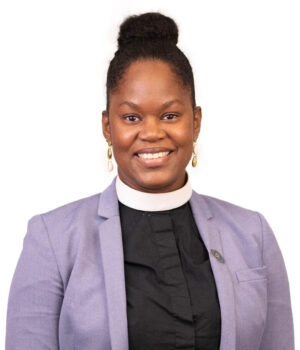
The Rev. Hershey Mallette Stephens
Dean of the Chapel and Spiritual Life
hmstephens@st-aug.edu
919.516.4241
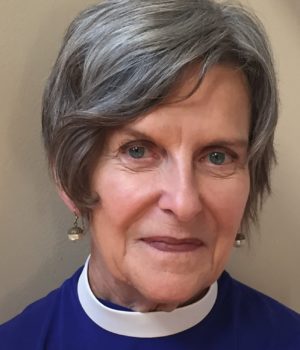
The Rev. Sallie Simpson
University Deacon
scsimpson@st-aug.edu

